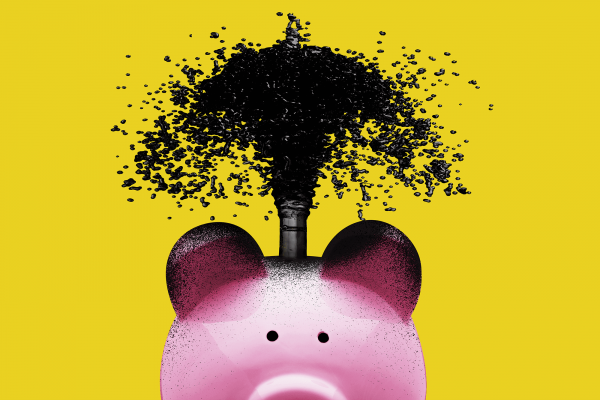SOMETIMES, WHEN YOU'RE reading a murder mystery, a new clue appears as if out of thin air—the coroner phones the detective to report that the corpse was drugged with some rare toxin, or an image conveniently appears on old CCTV footage. There was a similar moment in the climate fight this spring, when investigators came up with something remarkable: a number definitively linking the biggest banks in the world to the biggest crisis in the world.
We’ve known for quite a while, of course, that Chase, Citi, Wells Fargo, and Bank of America have been lending vast sums to the fossil fuel industry—more than a trillion dollars since the Paris climate accords were signed. But it took investigative research by a climate consultancy called South Pole to make clear exactly how massive that money was. They found, in essence, that if you kept $125,000 in the banking system (your retirement account, or your college savings fund), then that money emitted more carbon than all the other actions of a normal American life combined. That cash is recycled into pipelines and liquefied natural gas terminals—you might as well be spending it to drill oil wells in your backyard.
The main focus of the South Pole report was not individuals; it was the biggest companies on Earth, and it showed that while Google and Microsoft and Apple were busily trying to reduce their carbon footprints, their cash hoards were producing vast clouds of greenhouse gases simply by sitting in the bank. Google’s emissions were up 111 percent accounting for the new data—that is, their cash produces more carbon than everything else they do.
That’s potentially important: It means that these giants have both motive and opportunity to lean on the banks to stop their fossil fuel lending. The tech companies have all promised to reduce their carbon footprints to zero, which they can’t do if their bankers are spewing carbon. But they’re too big to bank with some small green bank—taken together, the cash holdings of the five biggest tech firms would make them the fifth-largest bank in the country. They can’t change banks; they have to change their banks.
For the rest of us, it’s easier. A local credit union or community bank is less likely to be engaged in the oil trade; there are a few banks (Amalgamated on the East Coast, Beneficial State on the West) that are explicitly fossil free. And there are credit cards to replace those from the big boys. Some of us at Third Act are helping to organize a pledge: If the banks won’t start to shift by year’s end, we’ll do a mass card-cutting and account-switching.
Changing your furnace and your car and your cooktop are relatively hard work; changing your bank isn’t painless, but it won’t cost you anything. Except a cloud of carbon hanging over your head.

Got something to say about what you're reading? We value your feedback!

